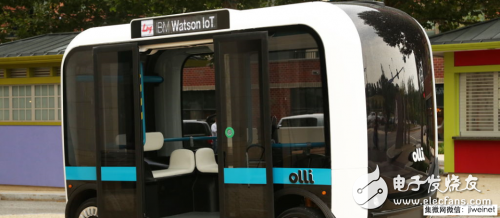IBM does not intend to enter the IoT device market, only focus on the development of the cloud IoT application platform "Watson IoT", and plans to combine the cognitive Internet of Things (CogniTIve IoT) technology to create a new IoT business application model.
IBM first demonstrated its latest IoT application example with cognitive computing technology in a self-driving minibus Olli in June this year, not only continuously uploading a large amount of data collected by sensors on the bus to the Watson IoT platform for machine learning training. It also incorporates multiple Watson cognitive APIs that allow passengers to communicate directly with Olli.
"In the future, IBM's IoT strategy will not enter the IoT device market, but only focus on the development of cloud IoT application platform." Xu Yun, the global leader of the Bluemax platform for the Internet of Things solution, IBM Cloud Computing Division, said that he recently came to Taiwan. With the dedicated IoT platform, the next step is to combine the cognitive Internet of Things (CogniTIve IoT) technology to create a new IoT business application model.

IBM has not only begun to combine IoT and cognitive computing technology. As early as last March, IBM began to add cognitive computing capabilities to its IoT service provided by its Bluemix cloud platform, hoping to make future IoT devices or devices. Can have AI function, and can have more interaction with users. At the end of last year, IBM changed its name to the newly named Watson IoT platform to provide related IoT services, and then began to promote cognitive IoT applications.
Xu You said that since the launch of the Watson IoT platform, it has been applied in IoT applications in various industries, such as the automotive industry Honda, Flowserve, aviation Boeing, Airbus, apparel industry Under Armour, manufacturing Siemens, Pratt & Whitney. , retail IKEA, and telecommunications industry AT&T have been adopted.
However, Xu You pointed out that unlike the IoT platforms launched by some IoT vendors, most of them manage and analyze the data collected from the IoT device to provide enterprises with improved organizational productivity or productivity. He believes that the future IoT platform More need for cognitive computing, can make IoT devices smart, not only communicate with people, but even understand the meaning of users through learning.
In order to have such IoT cognitive computing capabilities, Xu You said that it is not only machine learning technology, but also the ability to further combine deep learning to continuously send a large amount of data collected. The cloud system IoT platform is used to train and learn.
Xu You also took the example of the self-driving minibus Olli, which was recently built in cooperation with a US 3D printing car manufacturer, Local Motors. This mini bus not only uploads the data collected from the sensors on the car to the Watson IoT platform, but also adds Watson's cognitive APIs, such as voice input, to the data management and analysis services. Passengers can communicate directly with Olli.
For example, when asked if Olli wants to go there or when it is not there, the system backend will convert these voice commands into natural language to convert the structured data that the machine understands, and then integrate other data such as location and weather. After the analysis and calculation, to give passengers appropriate advice, "This is a new application example combined with cognitive IoT technology, and the trend of IoT application in the next two years," Xu You said.
In order to accelerate the deployment of IBM in the cognitive IoT application, IBM also established the Watson IoT department at the end of last year, and the Munich, Germany, as the global headquarters of IoT, is expected to be officially opened in October this year.
In addition, Xu You said that in addition to focusing on the IoT platform, the future will also work with more IoT device manufacturers to enable different IoT devices to access services on the Watson IoT platform through the use of the Watson SDK. More industrial IoT solutions.
Ceramic Parts,Advanced 95 Ceramic Materials,High Strength Ceramics,Durable Ceramic Components
Yixing Guanming Special Ceramic Technology Co., Ltd , https://www.guanmingceramic.com